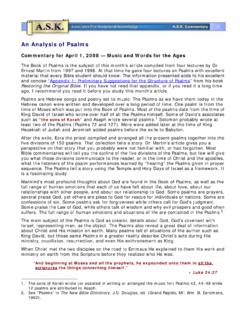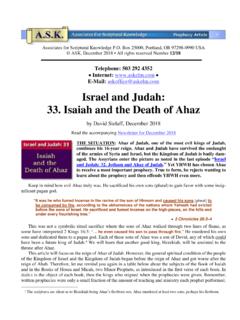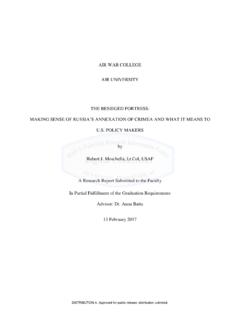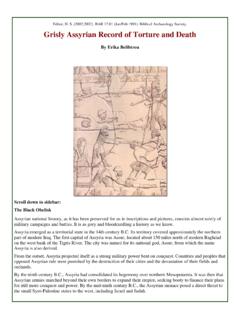Transcription of Israel and Judah, 8. Bathsheba and Rabbah
1 Associates for Scriptural Knowledge Box 25000, Portland, OR 97298-0990 USA ASK, April 2015 All rights reserved Number 4/15 Telephone: 503 292 4352 Internet: E-Mail: Israel and Judah: 8. Bathsheba and Rabbah by David Sielaff, April 2015 Read the accompanying Newsletter for April 2015 King David and Israel s armies were victorious in several battles because Yahweh saved David everywhere he went (2 Samuel 8:6, 14; 1 Chronicles 18:6, 13). The Ammonites precipitated a war, although other, more power-ful conspirators used them for their own purposes. A grand alliance of enemies formed to attack Israel on two occasions, God continued to give Israel the The enemies were defeated and the Ammonites re-treated to their capital of Rabbah (2 Samuel 10:6 14). Joab was sent to attack Rabbah . David stayed in Jerusalem and encountered Bathsheba .
2 Rabbah is a city located east of the Jordan River. In the time of David, Rabbah was the capital of the Ammonite kingdom. Today, Rabbah is known as Amman, the capital of the nation of Jordan. Israel s siege and assault on Rabbah began after the wars precipitated by the actions of the Ammonite king, Hanun, who ascended the throne of his father King Nahash. This attack upon Rabbah was retribution by Israel against the Ammonites conspiring to destroy Israel . The siege of Rabbah began in late spring after the crops were harvested, about a year after the wars ended. The siege continued through the events of David s encounter with Bathsheba , a period of almost two full years. This means that Rabbah endured a long siege with a source of water and plenty of stored food. It is important to realize that siege battles can be costly to the attacker as well as to the defender.
3 The defender brings all storable food into the granaries, denuding the countryside of all possible food for the enemy. The besieging army must continuously have their supplies brought to them during the two years of the siege. Not all of Israel s army was besieging Rabbah . Only at the end was the full force of Israel s army brought forth to attack and capture Rabbah . Victory came for Israel only after the source of water for the city was captured. So, let us continue the story: a See the narrative of the war and battles in Israel and Judah: 7. Conspiracy and War. This series of articles begins with the death of Saul and the enthronement of David as God s anointed king of Judah in Israel and Judah: 1. Saul and David. 2 TEXT: Israel Attacks Rabbah2 Samuel 11:1 1 It came to be at the year s return, the season when kings march forth, that David sent Joab and his servants with him, and all of Israel .
4 They brought ruin to the sons of Ammon and besieged on Rabbah , while David remained in Jerusalem. 1 Chronicles 20:1a 1a It came to be at the season of the year s return, the season when kings march forth, that Joab led out the combat force of the host and brought ruin to the land of the sons of Ammon; he came and besieged Rabbah , while David remained in Jerusalem. [end text] One must ask, in the first verse, what is meant by the season when kings march forth ? This is the time after the crops are harvested in late spring. Only then could the people and the nation afford to gather their soldiers to fight There were very few professional soldiers. David s mighty men were probably close to being professionals, as was the bodyguard of every king, Israelite or gentile. Therefore, most armies had a core of professional military men, supported by a mass levy of occasional or part-time troops, mostly farmers, who were called to fight when needed.
5 However, such troops cannot be kept from their fields too long or the economy would B oyd Seevers explains: Like other armies of the time, the Israelites probably campaigned between the spring and fall harvests, the two times when the men were most needed in the fields. The regular campaign-ing season began in the spring at the time when kings go off to war (2 Samuel 11:1; cf. 1 Kings 20:26). At that point, one s own harvest would have been done and the enemy harvest would be available to plunder.. Armies would fight through the dry summer months and return before the fall harvest and the advent of winter rains that made travel difficult, if not impossible. Boyd Seevers, Warfare in the Old Testamentd The first verse of 2 Samuel chapter 11 says that all of Israel went with Joab to ruin Ammonite lands. It seems that once the siege began and the capital of Rabbah was surrounded (so that few within the city could escape), many Israelites went The professional soldiers stayed, as did enough levy troops to maintain the siege.
6 They were likely paid from the plunder of the other Ammonite cities and towns. So, at the season when kings march forth, David does the opposite: David remained in Jerusalem. b A near identical expression is used in 1 Kings 20:22, 26: 22 Then the prophet came close to Israel s king and said to him, Go, reinforce yourself; realize and see what you should do; for at the return of the year the king of Syria will be coming up against you.. 26 It came to pass at the return of the year that Ben-hadad mustered the Syrians and went up to Aphek for the battle against Israel . c Israel s troops were organized according to the tribal structure (1 Chronicles 27:1). All men twenty years and older (Numbers 1:2 3, 45, 26:2) were liable to fight, although Moses allowed exceptions. This force was mostly infantry. They were the levy troops and the professional military.
7 The selfsame farmer who served in the ranks of the army was needed to produce the sur-plus yield to keep the war effort going. The longer he was kept under arms, the greater the danger of his private economic ruin and the collective influence on the economic health of the nation as a whole. Chaim Herzog and Mordechai Gichon, Battles of the Bible (Mechanicsburg, PA: Stackpole Books, 1997), p. 111. d Boyd Seevers, Warfare in the Old Testament: the Organization, Weapons, and Tactics of Near Eastern Armies (Grand Rapids, MI: Kregal Publications, 2013), p. 68. Most historians of ancient warfare note these same facts. Few armies marched and fought before the fall harvest or in the winter when food is scarce. e At the end of the siege, Joab asks King David to be present so Israel s king can have the glory of capturing the city. David gathered all the troops (presumably from around Israel ) to supplement the besieging army for the final assault.
8 (2 Samuel 12:29). 3 The next portion of the account (about David and Bathsheba ) only appears in Second Samuel, with no parallel account in First Chronicles. Like other serious problems in David s life, this one begins with a question. Again, it is likely that David already knew the answer to the question. David was about to commit a multitude of sins which would affect his kingdom, his kingship, and the trust of his mighty men. It would even affect the future succession and lives of his royal family and heirs. Repercussions for David s dynasty would last many generations, until Nebuchadnezzar ends the kingship of Judah. Nor would David s evil actions remain secret. All the facts would become public knowledge .. immediately. TEXT: King David, Bathsheba , and Uriah 2 Samuel 11:2 13 2 It was at eventide, and David arose from on his bed.
9 When he walked about on the housetop of the royal palace, he saw from on the housetop a woman bathing. The woman was exceedingly good in appearance, 3 and David sent someone to inquire about the woman. He reported, Is this not Bathsheba daughter of Eliam and wife of Uriah the Hittite? 4 David sent messengers that he might take her; she came to him, and he lay with her she had just hallowed herself from her uncleanness. Then she returned to her house. 5 When the woman became pregnant, she sent to tell David, saying, I am pregnant. 6 At this David sent word to Joab, saying, Send Uriah the Hittite to me. And Joab sent Uriah to David. 7 When Uriah came to him, David asked him about Joab s well-being and the soldiers well-being and about any accomplishment in the war. 8 Then David said to Uriah, Go down to your house and bathe your feet. So Uriah went forth from the royal palace, and a helping from the king s table was brought forth after him.
10 9 Yet Uriah lay down at the portal of the royal palace with all the other servants of his lord and did not go down to his house. 10 When they told David, saying, Uriah did not go down to his house, then David asked Uriah, Have you not come from a journey? For what reason did you not go down to your house? 11 Uriah replied to David, The cofferf and Israel and Judah are dwelling in booths, and my lord Joab and the servants of my lord are camping on the face of the field. Then how can I enter my house to eat and to drink and to lie down with my wife? By your life and by the life of your soul, I shall assuredly not behave in this manner! 12 Then David said to Uriah, Stay in this place today also, and tomorrow I shall send you off. So Uriah remained in Jerusalem on that day, and on the morrow. 13 And David invited him that he might eat and drink in his presence; and he made him drunk.











